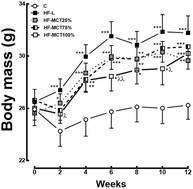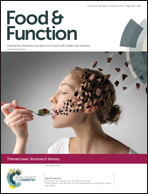A rich medium-chain triacylglycerol diet benefits adiposity but has adverse effects on the markers of hepatic lipogenesis and beta-oxidation
Abstract
We investigated the increasing amounts of medium-chain triacylglycerol (MCT) in the diet on hepatic lipid metabolism. Mature C57BL/6 male mice were randomly divided into five groups (n = 10/group). The animals received their diet for 12 weeks, as a control (C group, 10% of energy from lipids); high-fat lard (HF group, isoenergetic diet, 50% of energy from lipids with lard); a mixture of lard and MCT oil (with a gradual replacement of lard by MCT: HF-MCT25%, HF-MCT75%, and HF-MCT100% groups). At euthanasia, we collected blood and dissected the liver for analyses (glucose, insulin, HOMA-IR, QUICK index, and triacylglycerol, light microscopy, western blotting, and RT-qPCR). The HF diet groups showed a greater body mass gain compared to the C group, but the HF-MCT100% group showed diminished adiposity and amelioration of insulin resistance. All the HF groups also showed a clear increase in hepatic lipid accumulation, increased lipogenesis and decreased PPAR-alpha expression, although HF-MCT groups showed improved local insulin signaling. Lastly, the HF-MCT100% group had raised markers of beta-oxidation (UCP3 and MCAD) and mitochondrial biogenesis (PGC1-alpha and NRF1). In conclusion, the findings demonstrated that a high amount of MCT (HF-MCT100% group) added to an HF diet reduces the body fat accumulation and insulin resistance. However, the lipid accumulation as well as the lipid metabolism is altered in the liver of animals fed with a very high MCT diet, indicating that higher doses of MCT may be harmful in a long-term.



 Please wait while we load your content...
Please wait while we load your content...